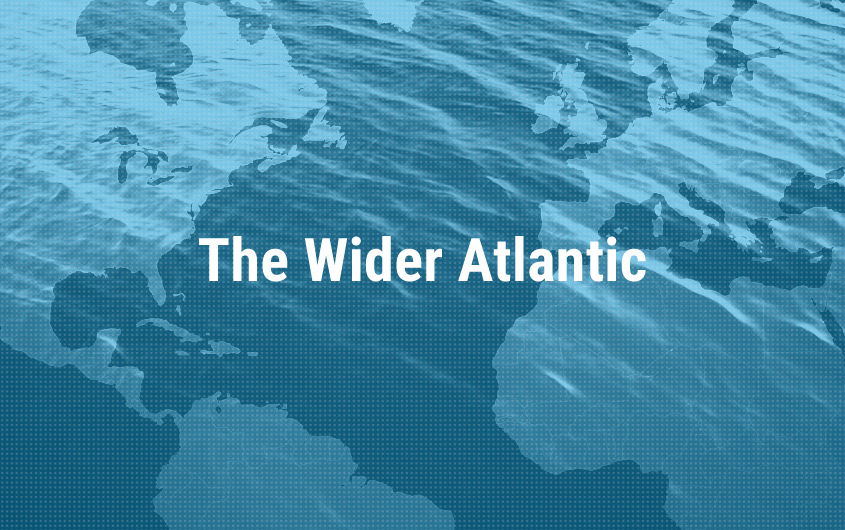
John Kennedy and Illiberalism

Peter S. Rashish
Vice President; Director, Geoeconomics Program
Peter S. Rashish, who counts over 30 years of experience counseling corporations, think tanks, foundations, and international organizations on transatlantic trade and economic strategy, is Vice President and Director of the Geoeconomics Program at AICGS. He also writes The Wider Atlantic blog.
Mr. Rashish has served as Vice President for Europe and Eurasia at the U.S. Chamber of Commerce, where he spearheaded the Chamber’s advocacy ahead of the launch of the Transatlantic Trade and Investment Partnership. Previously, Mr. Rashish was a Senior Advisor for Europe at McLarty Associates, Executive Vice President of the European Institute, and a staff member and consultant at the International Energy Agency, the World Bank, UNCTAD, the Atlantic Council, the Bertelsmann Foundation, and the German Marshall Fund.
Mr. Rashish has testified before the House Financial Services Subcommittee on International Monetary Policy and Trade and the House Foreign Affairs Subcommittee on Europe and Eurasia and has advised three U.S. presidential campaigns. He has been a featured speaker at the Munich Security Conference, the Aspen Ideas Festival, and the Salzburg Global Seminar and is a member of the Board of Directors of the Jean Monnet Institute in Paris and a Senior Advisor to the European Policy Centre in Brussels. His commentaries have been published in The New York Times, the Financial Times, The Wall Street Journal, Foreign Policy, and The National Interest, and he has appeared on PBS, CNBC, CNN, NPR, and the BBC.
He earned a BA from Harvard College and an MPhil in international relations from Oxford University. He speaks French, German, Italian, and Spanish.
May 29 will mark the 100th anniversary of the birth of John F. Kennedy, the 35th President of the United States. Kennedy may be well known not only to Germans, but more widely in the democratic world for his June 26, 1963, speech where he defied Soviet communism by declaring “Ich bin ein Berliner.” But he deserves to be equally well known for his far-sighted approach to the transatlantic relationship.
The Trade Expansion Act of 1962 is a still unrivalled exercise to engage Europe—at the time, the five-year old, seven-country Common Market, now the 28-member European Union—as a partner to open global markets and create new rules for world trade. The Obama administration sought to build on Kennedy’s legacy with the Transatlantic Trade and Investment Partnership (TTIP) it launched with the EU in 2013, but it remained unconcluded when he left office and has not yet been revived by the Trump administration.
Not only does the Act explicitly link trade and the broader U.S. national interest, but it also couples trade liberalization with assisting workers impacted by greater economic openness. The preamble to the Act states its purpose to be “To promote the general welfare, foreign policy, and security of the United States through international trade agreements and through adjustment assistance to domestic industry, agriculture, and labor, and for other purposes.” These concerns about the proper division of labor among domestic, trade, and foreign policies to advance U.S. prosperity and security are once again front and center.
There are many other ways that Kennedy was a man ahead of his time: his understanding of the power of television and other media as tools to communicate with the public; the call in his American University commencement speech to “make the world safe for diversity,” heralding today’s multipolar world; and the nuclear test ban treaty agreed during his administration that launched a succession of arms negotiations with the Soviet Union.
Given the rise of populism in both the United States and Europe, perhaps Kennedy’s words that are of most enduring value are what he said about the idea of liberalism. Rather than seeing it as a political party orientation, in 1960 Kennedy defined it this way:
These words capture the key economic principle that is at the heart of the rules-based, liberal international order: that prosperity comes through openness to change, a rejection of ideology, and engagement in the world.
Populism, and the illiberal values it serves, can be defeated. But it will take more of the self-confidence, forthrightness, and rhetorical verve that John Kennedy possessed to win the debate.









